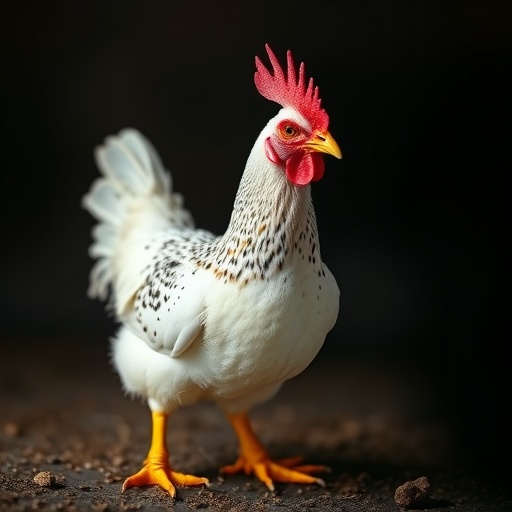In a groundbreaking study, researchers have unveiled vital insights into the genetic mechanisms governing fat deposition in chickens, a topic of paramount interest due to its implications for both poultry management and broader agricultural practices. The research, spearheaded by a team of scientists, including Abbasabadi, Bakhtiarizadeh, and Mansourizadeh, has explored the nuances of selection signatures within chicken populations differentiated by their growth rates. This novel approach to understanding genetic selection opens up new pathways for enhancing breed performance and improving meat quality, ultimately contributing to the sustainability of poultry farming.
At the crux of this research lies the concept of selection signatures, a fundamental aspect of evolutionary biology and genetics. These signatures can be thought of as marks left on the genome by the forces of natural selection; they indicate regions of the DNA that have been favored over others in specific environmental or breeding contexts. By investigating these signatures in chickens, the researchers aimed to identify candidate genes associated with fat deposition—an essential trait influenced by both genetic makeup and environmental conditions.
The methodologies employed in this study are as intriguing as the findings themselves. Utilizing a combination of genomic data analysis and advanced statistical models, the researchers examined various chicken populations that had been selectively bred for either rapid or slow growth rates. This divergent selection process allowed them to pinpoint variations in the genome that correlate with significant differences in fat deposition. The implications of these findings extend beyond mere academic interest, providing actionable insights for poultry breeders aiming to optimize their flocks for specific traits.
One of the more surprising results of the study was the identification of several novel candidate genes previously unassociated with fat deposition in poultry. These genes are believed to play crucial roles in metabolic pathways, potentially influencing how poultry process and store fat. As such, the implications of this research are far-reaching, suggesting that targeted genetic selection could yield chickens with improved growth efficiency and overall health.
In addition to the new insights gained regarding fat deposition, this research highlights the importance of genomic resources in modern agriculture. As the poultry industry faces increasing pressure to produce meat in a sustainable manner, understanding the genetic basis of important traits is becoming imperative. The integration of genomic tools and selection signatures in breeding programs can help poultry producers make more informed decisions, ultimately improving yield and reducing the environmental impact of poultry farming.
Moreover, the study provides an important framework for future research in the field of animal genetics. By demonstrating the effectiveness of selection signature analysis in understanding complex traits like fat deposition, the researchers have established a model that can be applied to other species and traits. This approach could revolutionize how we understand animal breeding, with potential applications that extend well beyond chickens.
Additionally, the timing of this research is particularly pertinent given the increasing global demand for poultry products. With an estimated 1.5 billion chickens produced annually for meat globally, improvements in growth rates and meat quality could have significant economic benefits. As consumer preferences continue to shift towards healthier and more sustainable protein sources, this research provides essential insights that can help bridge the gap between consumer demand and production capabilities.
Furthermore, the findings from this study underscore the ethical considerations inherent in selective breeding practices. As breeders and producers gain access to more detailed genomic information, they will need to navigate the balance between optimizing production traits and maintaining animal welfare. This is an ongoing conversation within the agricultural community, and studies like this one contribute valuable data to inform these discussions.
The implications of the research extend into the realm of food science as well. Understanding how genetic factors influence fat deposition in chickens can have ramifications for meat quality, including tenderness, flavor, and nutritional value. As researchers continue to decipher the genetic underpinnings of these traits, there is significant potential for developing chicken varieties that meet consumer expectations while also adhering to sustainable farming practices.
Additionally, the research touches on the broader themes of biodiversity and conservation. As certain breeds of chickens are favored for their growth traits, there is a risk of diminishing genetic diversity within poultry populations. By highlighting the importance of selection signatures and maintaining a diverse genetic pool, this study advocates for a more holistic approach to poultry breeding that takes into account both productivity and conservation.
Overall, this research represents a significant advancement in our understanding of chicken genetics and its application in poultry breeding. By elucidating selection signatures related to fat deposition, the team of researchers provides a pivotal resource for future investigations into animal genetics. The hope is that these discoveries will inspire further studies that can lead to innovative practices in the agricultural sector, fostering a more sustainable and efficient poultry industry.
In conclusion, the study’s findings have the potential to reshape the landscape of poultry breeding, emphasizing the importance of genetic research in meeting the challenges posed by a growing global population and changing consumer preferences. As the industry strives to balance productivity with sustainability and animal welfare, the insights gained from this research may pave the way for a new era in poultry management that prioritizes both efficiency and ethical considerations.
The future holds great promise as researchers continue to delve into the complexities of genetics in livestock, and the innovations born from this knowledge may very well redefine our approach to food production in the years to come.
Subject of Research: Genetic mechanisms governing fat deposition in chickens.
Article Title: Selection signature analysis in chickens divergently selected for growth rate reveals novel candidate genes regulating fat deposition.
Article References:
Abbasabadi, H., Bakhtiarizadeh, M.R., Mansourizadeh, H. et al. Selection signature analysis in chickens divergently selected for growth rate reveals novel candidate genes regulating fat deposition.
BMC Genomics (2025). https://doi.org/10.1186/s12864-025-12360-9
Image Credits: AI Generated
DOI:
Keywords: Genetic selection, selection signatures, fat deposition, poultry breeding, sustainability, chicken genetics, novel candidate genes.




